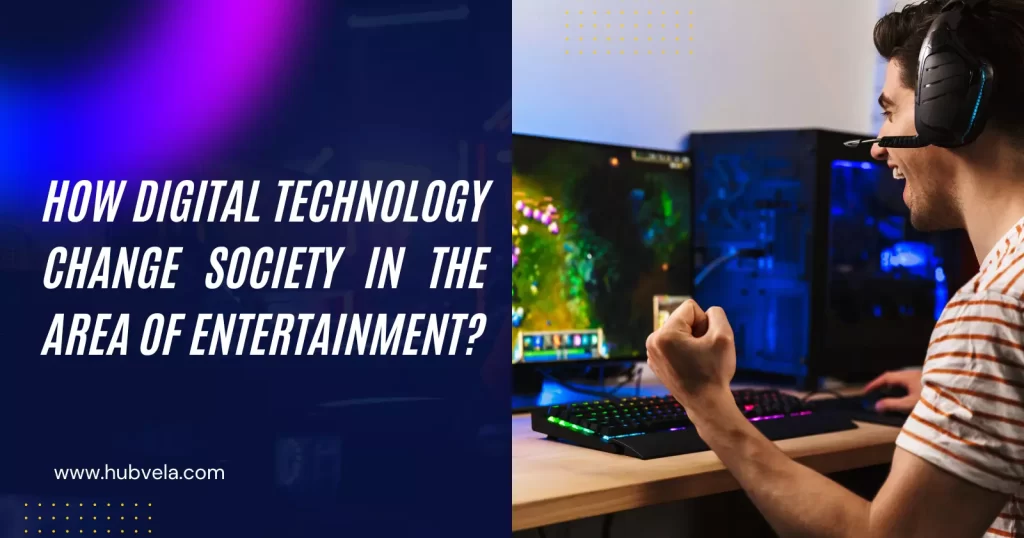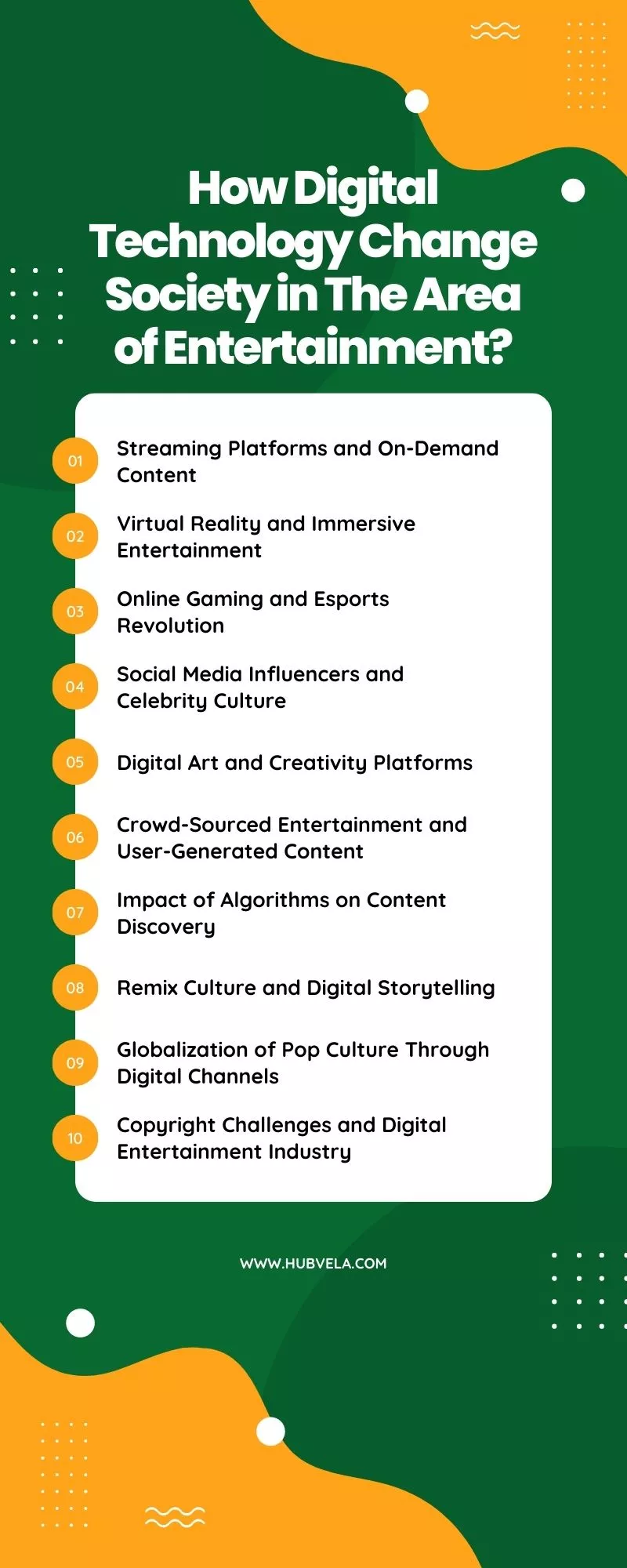Digital technology has had a significant impact on society in the area of entertainment. The entertainment industry has undergone a transformation in recent years, with digital media changing how studios disseminate marketing content, artists engage with fans, and consumers interact with their content.
The rise of digital technology has made entertainment more accessible, affordable, and convenient for users to learn and have fun.
The consumption of television via on-demand streaming sites is not the only significant change in how we consume television content.
There has been a tremendous shift in how we engage with television programming and how we interact with one another around television.
In this article, we will explore how digital technology has changed society in the area of entertainment. We will examine the benefits and challenges of digital technology in the entertainment industry and how it has transformed the way we consume and create entertainment content.

--Advertisement--
How Digital Technology Change Society in The Area of Entertainment (Infographics)

1. Streaming Platforms and On-Demand Content
Streaming platforms and on-demand content have transformed the entertainment industry, providing instant access to a vast library of TV shows, movies, and user-generated content.
Digital platforms such as Netflix, YouTube, and Twitch have disrupted traditional cable and satellite TV industries, allowing users to watch their favorite shows on-demand and on their own schedule.
Similarly, the film industry has witnessed the emergence of streaming services like Netflix and Amazon Prime Video, which have disrupted traditional cinema and DVD rental business models.
The rise of subscription-based streaming services like Hulu and HBO Max has also transformed the television industry. Digital technology has made entertainment more accessible, affordable, and convenient for users to learn and have fun.
2. Virtual Reality and Immersive Entertainment
Virtual reality (VR) and immersive entertainment have transformed the entertainment industry, providing users with a more immersive and interactive experience.
VR technology creates a computer-generated, three-dimensional virtual environment that users can interact with, typically accessed via a computer that is capable of projecting 3D information via a display, which can be isolated screens or a wearable display, e.g., a head-mounted display (HMD), along with user identification sensors.
VR technology has been used in various entertainment applications, including gaming, movies, and live events.
The use of VR technology in entertainment has enabled users to experience entertainment content in a more immersive and interactive way, providing a more engaging and memorable experience.
The rise of VR technology has also created new opportunities for content creators and businesses, enabling them to create new and innovative entertainment experiences.
3. Online Gaming and Esports Revolution
Online gaming and esports have revolutionized the entertainment industry, providing users with a new way to engage with entertainment content.
With the widespread availability of high-speed internet and advancements in gaming technology, online gaming has become a global phenomenon, captivating millions of players and reshaping the entertainment landscape.
Online gaming has transcended the boundaries of traditional entertainment, with gaming tournaments and esports events drawing large audiences and generating significant revenue.
Streaming services like Twitch and YouTube Gaming have provided platforms for gamers to share their gameplay experiences with a wider audience, fostering a sense of community and expanding the reach of online gaming beyond just the players themselves.
The rise of online gaming and esports has created new opportunities for content creators and businesses, enabling them to create new and innovative entertainment experiences.
4. Social Media Influencers and Celebrity Culture
Social media influencers and celebrity culture have been significantly impacted by digital technology, changing the way celebrities interact with their fans and how businesses market their products.
With the rise of platforms like TikTok, Instagram, and Twitter, celebrities and influencers have more power to interact with their fans, and the average internet star can have more influence than companies.
Social media has had a profound impact on the entertainment industry as a whole, creating new opportunities for aspiring artists to gain exposure and has given rise to new types of content, such as influencer marketing and sponsored posts.
However, it has also disrupted traditional distribution models and led to a decline in the profitability of traditional media outlets such as newspapers and magazines.
5. Digital Art and Creativity Platforms
Digital Art and Creativity Platforms have been greatly impacted by digital technology, leading to significant changes in the entertainment industry. Digital technology has made art and creativity more accessible to a wider audience.
With the rise of digital platforms, artists can showcase their work online, reaching a global audience without the limitations of physical galleries or exhibitions. Digital technology has facilitated collaboration among artists and creators.
Through online platforms, artists can connect and collaborate with others from different parts of the world, sharing ideas, techniques, and resources. This has led to the emergence of new and innovative art forms and styles.
Digital technology has introduced new tools and techniques that have revolutionized the creation process. Digital art software and hardware allow artists to experiment with different mediums, textures, and styles, pushing the boundaries of traditional art forms.
This has opened up new possibilities for artistic expression and creativity. Digital platforms have revolutionized the distribution and consumption of art and entertainment.
Online marketplaces and streaming platforms have made it easier for artists to showcase and sell their work directly to consumers, bypassing traditional gatekeepers.
This has democratized the industry and provided opportunities for emerging artists to gain recognition. Digital technology has enabled the creation of interactive and immersive experiences in the entertainment industry.
Virtual reality (VR) and augmented reality (AR) technologies have transformed the way people engage with art, allowing them to become active participants in the creative process.
Digital technology has had a profound impact on the world of digital art and creativity platforms. It has expanded access, fostered collaboration, introduced new tools and techniques, and transformed the way art is distributed and consumed.
These changes have not only influenced the entertainment industry but also shaped society’s perception and engagement with art.
6. Crowd-Sourced Entertainment and User-Generated Content
Digital technology has changed the way consumers interact with entertainment. Consumers are no longer passive recipients of content but active participants in the creation and distribution process.
This has led to a shift in power dynamics, with consumers having more control over the content they consume.
Social media platforms and online forums provide a space for users to share their opinions, ideas, and creations, fostering a sense of community and engagement. User-generated content has given rise to new business models in the entertainment industry.
Companies can leverage user-generated content to create new products, services, and experiences, tapping into the creativity and passion of their audience. Social media has become a powerful tool for social justice and activism.
Movements like BlackLivesMatter and MeToo have utilized social media to raise awareness, build communities, and share narratives.
Nonprofits and social justice organizers can use social media to share information, build an audience, and promote events.
7. Impact of Algorithms on Content Discovery
The impact of algorithms on content discovery has been significant in the area of entertainment due to the rise of digital technology.
With the increasing amount of content available online, algorithms are used to personalize and recommend content to users based on their interests and viewing history.
This has led to a shift in the way people consume entertainment, as they are now more likely to discover new content through algorithmic recommendations rather than traditional methods such as word-of-mouth or advertising.
However, there are concerns about the potential for algorithms to create filter bubbles and limit exposure to diverse viewpoints.
As such, it is important to consider the ethical implications of algorithmic content discovery and ensure that users are exposed to a wide range of content.
8. Remix Culture and Digital Storytelling
Remix culture and digital storytelling have been significantly impacted by digital technology in the entertainment industry. With the rise of digital devices and software, it has become easier for creators to remix and repurpose existing media content.
Remix culture has been around for centuries, and it has played a fundamental role in the evolution of culture. The availability of tools to create and remix content has made it easier for artists to assimilate what has come before and create new works of art.
However, there are concerns about the impact of copyright laws and content moderation on remix culture. Despite these challenges, the remix should be seen as a valuable form of creative expression that allows for the exploration of new ideas and perspectives.
As such, it is important to defend the freedom of creative expression and acknowledge the role that remix culture has played in cultural evolution.
9. Globalization of Pop Culture Through Digital Channels
The globalization of pop culture through digital channels has been a significant impact on digital technology in the entertainment industry. The rise of digital platforms such as streaming services has made it easier for content to be distributed globally.
This has led to a cross-fertilization of pop culture from around the world, making it commonplace. American popular culture, in particular, has been a crucial export, with TV being one of the primary ways for American entertainment to reach foreign shores.
However, there are concerns about the potential for globalization to create a homogenized culture and limit exposure to diverse viewpoints.
The power to influence popular culture no longer lies with the relative few with control over traditional forms of mass media; it is now available to the great mass of people with access to the Internet.
As such, it is important to consider the ethical implications of globalization and ensure that diverse perspectives are represented in the content that is distributed globally.
10. Copyright Challenges and Digital Entertainment Industry
The digital entertainment industry has faced significant copyright challenges due to the ease with which digital content can be shared and distributed.
Copyright infringement tensions between digital media platforms and traditional media are at an all-time high, with pressure from copyright holders combined with aggressive infringement-flagging algorithms and significant penalties under current regulations pushing platforms to take down content, often before infringement has been proven.
While there are legitimate concerns regarding copyright infringement online, current regulation incentivizes over-blocking content in order to avoid fines, which is alienating content creators and limits free speech and innovation.
The widespread availability of digital technologies has made it easier than ever before to reproduce, distribute, and access copyrighted materials, leading to an increase in online piracy and copyright infringement.
The challenges of intellectual property in the digital age are significant, and it is important to consider the ethical implications of copyright enforcement and ensure that content creators are protected while also promoting innovation and free speech.
Conclusion on How Digital Technology Change Society in The Area of Entertainment
In conclusion, digital technology has had a significant impact on the entertainment industry, transforming both content creation and consumption.
The rise of digital platforms has made it easier for content creators to distribute their work globally, while also providing consumers with accessible, personalized, and cost-effective content.
However, there are also concerns about the potential for digital technology to create filter bubbles, limit exposure to diverse viewpoints, and infringe on copyright laws.
As such, it is important to consider the ethical implications of digital technology in the entertainment industry and ensure that content creators are protected while also promoting innovation and free speech.
The future of the entertainment industry will undoubtedly continue to be shaped by digital technology, and it is up to us to ensure that it is used in a responsible and ethical manner.


